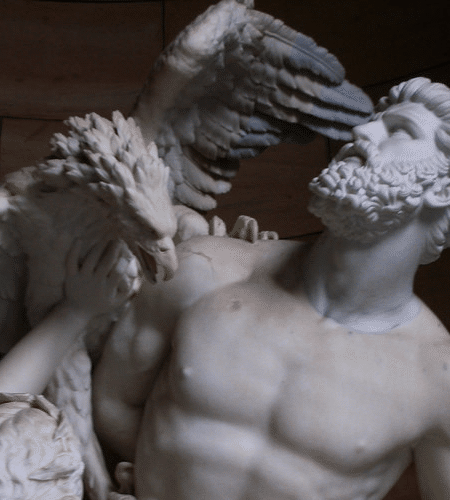Prometheus stands as the Titan god of fire, known for his cunning intellect and rebellious spirit. Born to the Titan Iapetus and the Oceanid Clymene, Prometheus emerged as a pivotal character in the epic struggle between the Titans and the Olympian gods.
His name, derived from the Greek words “pro,” meaning before, and “manthano,” meaning intelligence, encapsulates the essence of his character. His name also means “forethinker” or “wise before,” belies a complex character, one driven by a deep-seated concern for humanity’s well-being.
Prometheus was endowed with unparalleled foresight and a profound understanding of the cosmos, distinguishing him as a beacon of knowledge among his Titan brethren.
One of the most enduring tales associated with Prometheus centers on his benevolent act towards humanity. In an audacious move, he defied the will of Zeus, the king of the Olympian gods, by stealing fire from Mount Olympus and gifting it to mortal beings.
This sacrificial act bestowed upon humanity the transformative power of fire, enabling progress, warmth, and the evolution of civilization.
However, Prometheus’ audacity did not escape the wrath of Zeus. The Titan faced severe repercussions for his defiance, enduring eternal torment. Strikingly, he was bound to a rock on Mount Caucasus, where each day an eagle would feast upon his liver, only for it to regenerate overnight, subjecting him to perpetual suffering.
Despite his tragic fate, Prometheus became an enduring symbol of human enlightenment and resilience. His defiance against divine authority and his enduring commitment to humanity’s welfare elevated him to a revered figure in both Greek mythology and later philosophical traditions.
Let’s explore the enduring legacy of Prometheus in this captivating exploration and learn about his life, parents and childrens, symbols but also his role in greek mythology.
Origins and Biography
Prometheus was born to Iapetus and Clymene, both Titans, making him a second-generation Titan. His siblings included Atlas, Epimetheus, and Menoetius, among others.
The Titans, precursors to the Olympian gods, were a powerful and ancient race that clashed with the newer generation of deities led by Zeus.
He was a skilled craftsman and a master of metallurgy. He is credited with creating humankind from clay, imbuing them with the gift of fire, and teaching them agriculture, medicine, and the arts. These acts of kindness and generosity earned him the title “Father of Mankind” and established him as a champion of humanity.
Prometheus’s story has been reinterpreted and celebrated throughout history. He represents the divine spark within humanity, the capacity for innovation, and the pursuit of knowledge. His defiance of authority, even at great personal cost, serves as a reminder of the importance of challenging unjust systems and advocating for the welfare of others.

Comments